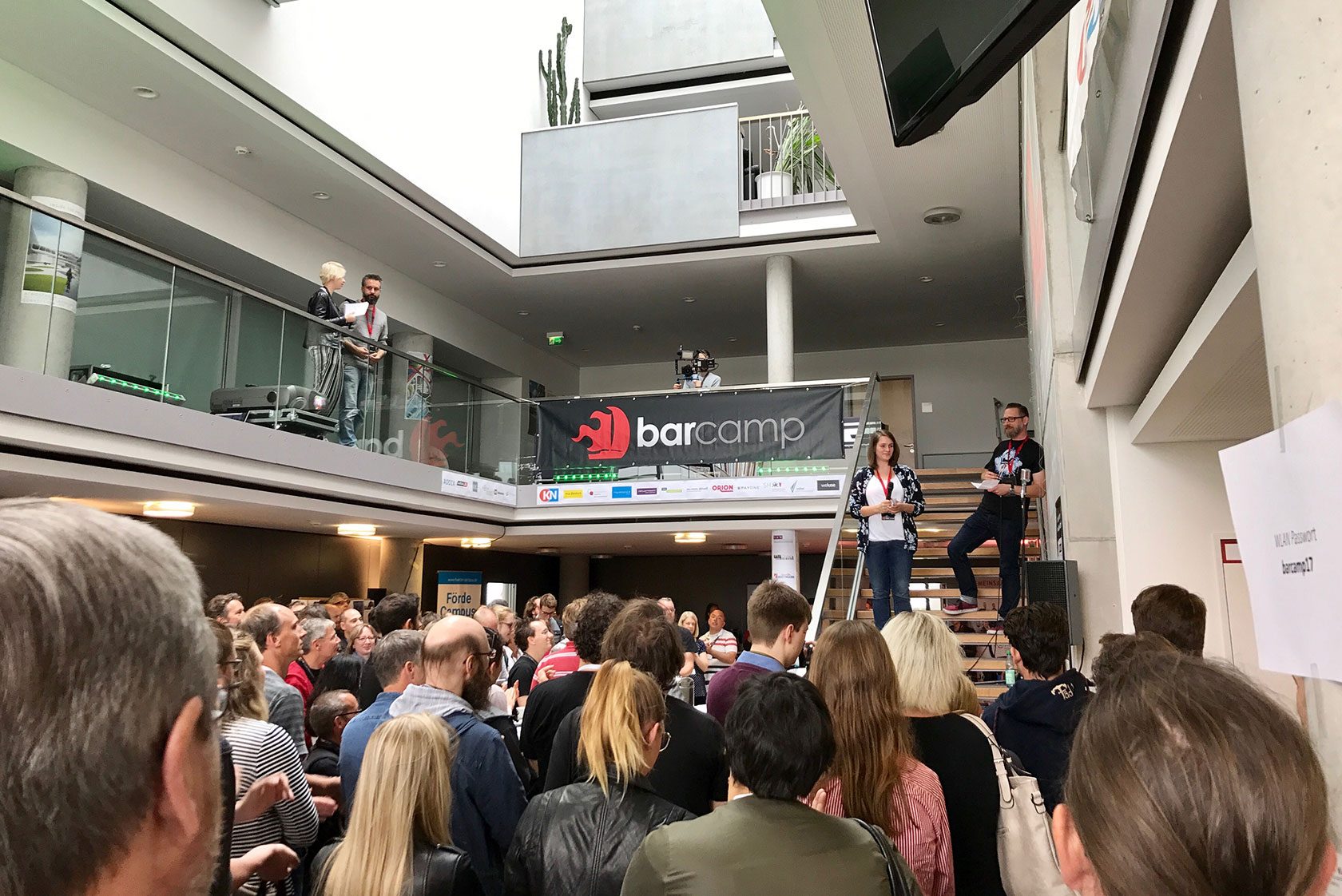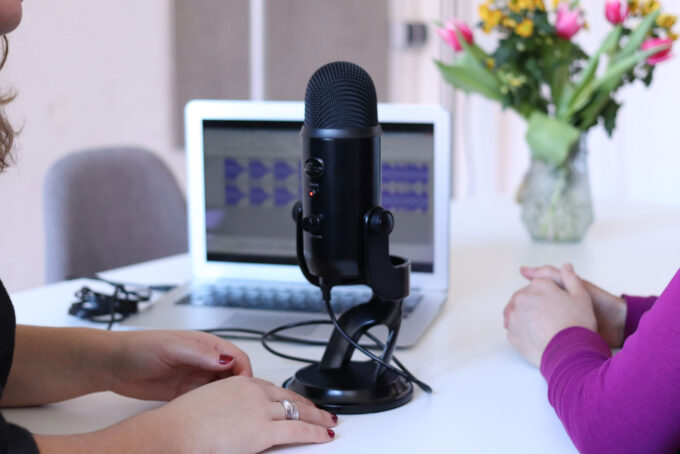
BarCamp Kiel 2017: Self-Organised Learning and Working, #Meetingwahnsinn and a Bitcoin Pizza
The 8th Kiel BarCamp offered a wide range of session topics. From new learning formats, self-organisation and tools for collaboration to bitcoins, augmented reality and virtual reality – and from Amazon Alexa to digital civic participation and influencer marketing.
The 8th BarCamp Kiel (#bcki17) (link in German) took place on 11 and 12 August 2017. Everything was organised fantastically – as in previous years – and the roughly 300 people participating each day had a lot of fun. The exciting mixture of participants from business, academia and society – right through to the minister-president of the state of Schleswig-Holstein – contributed to this.
Auf dem Barcamp #bcki17 wird auch der MP geduzt! pic.twitter.com/VCTPD4gmB2
— Nicole Schwerdtfeger (@RotStich) 11. August 2017
Sessions, Sessions, Sessions … #bcki #bcki17 pic.twitter.com/2j5m0Xan9o
— BarCamp Kiel (@barcampkiel) 11. August 2017
Learning Differently – Why BarCamps are More Fun
In the session, Dr Inge Schröder spoke about a eureka moment and gathered a few reasons why learning in BarCamps, hackathons and similar formats is especially fun and thus especially effective:
- A self-determined selection of learning contents rather than the fulfilment of learning responsibilities, means that learners take responsibility for their own learning process
- Collaboration
- A feedback culture instead of an evaluation cultur
- Vertrauen und Mut anstelle von Angst
- Instead of finding answers that are already known, asking questions whose answers are not yet known.
Ohne eine Fehlerkultur können keine Schätze gehoben werden. Session mit Inge.#bcki17
— Frank Lindecke (@Kimayoi) 11. August 2017
Digital Civic Participation
The session on digital civic participation in Schleswig-Holstein by Oliver Voigt was titled 6,000 Opinions (on the Locations of Wind Farms) – What Do I Do with the Digital Citizen? In spite of all the possibilities that digital citizen participation and collaboration offer, as things stand today, only analogue civic participation is legally required –displaying documents at town halls. In addition, paper continues to enjoy great popularity among many citizens. Submissions are often not submitted electronically, instead being printed out (often many copies thereof), then signed – which is particularly important to many people, as it seems like the obvious way to do things when communicating with the authorities – and sent by post. Even though anonymous comments are possible.
#usability ist für #bürgerbeteiligung wichtig, Angebot muss niedrigschwellig sein #bcki17
— Anke J. (@HolsteinDeern) 11. August 2017
Session auf dem #bcki17 zur digitalen Bürgerbeteiligung. pic.twitter.com/qPtktK5Mtq
— Christian Graf (@_twain_) 11. August 2017
Collaboratively Shaping Society
In the course of this session, the PerLe team led by Frauke Godat focused on the collaborative shaping of society through what is called a Reallabor – a kind of collaborative project between institutions from academia and civil society. The focus was on presenting their Reallabor activities vorstellten (see also: “Neue Räume für Arbeit 4.0 und Lernen 4.0: Auswirkungen für das Bildungssystem?“). The basic idea is keeping universities open to the public, but also keeping the public open to universities. During the session, small groups worked on key issues for the joint project, such as:
- How can the transfer of responsibility be carried forward in such forms of work?
- What aspects of collaborative forms of work generate value for each individual?
Wir sind auch mit einer Session dabei, @crazylittlenici stellt sie vor❣️ #DMWSH #DMWsichtbar pic.twitter.com/UwvYrhUTT4
— Digital Media Women (@DigiWomenSH) 11. August 2017
Digital Media Women – What’s Going on in Schleswig-Holstein?
The organisation team for Digital Media Women’s quartier in Schleswig-Holstein founded last spring, presented its previous and planned activities and encouraged participation and/or support.
Wir stellen uns und die @DigiWomenDE vor. Volle Hütte, wir freuen uns! #DMWSH #bcki17 pic.twitter.com/zEmumJ7fAN
— Digital Media Women (@DigiWomenSH) 11. August 2017
Ingo Sauer showed how the Deutsche Bahn subsidiary DBSystel is forging a path away from hierarchical leadership systems and towards self-organisation. The change of the management system is motivated by the awareness that the previous system was too slow and the long-term survival of the company is at stake. A summary of the action can also be found in this blog post (in German). One thing being used is the brand book “Der Systelaner“, (link in German), which illustrates the self-image and interpersonal interaction at DBSystel.
Meine Session auf dem @barcampkiel zum Thema #Selbstorganisation bei der @dbsystel um 16 Uhr im Raum naymspace #bcki17 pic.twitter.com/tQuSUf12Jf
— Ingo Sauer (@scytto) 11. August 2017
Hier das #SessionGrid für Tag 2 (Samstag) auf dem #bcki17 pic.twitter.com/TG6DrYXlfA
— BarCamp Kiel (@barcampkiel) 12. August 2017
Build Skills for Amazon Echo/Alexa
After a brief introduction to Amazon Echo/Alexa (also see “Revival der Chatbots: Revolution des Kundenkontakts, Disruption des Software-Marktes?”) (in German), Sebastian Müller showed how, in principle, it’s relatively easy to deploy your own skills in building for Alexa. During the short session, he got the Amazon Echo Dot to give some information on where BarCamp Kiel was taking place.
Tools for Organisation in Teams
In der Session von Alexander Bernhardt ging es um kollaborative Tools wie Trello und JIRA und den Austausch über ihren Einsatz für die Organisation in Teams.
KreativHack – Hackathons in Kiel
Frank Bartels reported from the Hackathons (in German) which was organised in Kiel – and also spoke about those Hackathons planned for the future. On 3 and 4 November, there will be a new KreativHack Hackathon, this time focusing on EdTech.
#meetingwahnsinn
Anke Nehrenberg used the #meetingwahnsinn hashtag to present a few anecdotes and absurdities from her wealth of experience with meetings. Among the countermeasures discussed for ineffective sessions were things like timeboxing and consent-driven decision-making. There are only three response options for the latter:
- Yes;
- OK, I am not enthusiastic, but I support the decision;
- No. In the case of the latter, however, a counter-proposal is compulsory.
Um #Meetingswahnsinn zu verhindern, kann Zeitbegrenzung, Themen-Timeboxen und eine sehr gute Vorbereitung helfen. #bcki17 @moeglichewelten pic.twitter.com/MDSmT51AAr
— Birte Sindt (@AhoiNupsi) 12. August 2017
Bitcoins
Darius Karampoor took us into the world of Bitcoin. Afterwards, we knew, that just like your purse, you should never leave your Bitcoin Wallet lying around. Especially since the bitcoin exchange rate recently hit the $4,000 mark! At the end of the session, some Bitcoins were transfered, using an app like “Mycelium Bitcoin Wallet”, and a pizza was paid for in bitcoins:
#bitcoinpizza ist da #bcki17 gerne zugreifen, steht im Foyer (mit bitcoin bezahlt) #btc #crypto #kiel #salami #salatauch pic.twitter.com/ISgsl2jevr
— Darius Karampoor (@1337darius) 11. August 2017
Jetzt geht's in die #VirtualReality mit @Krnsi – Woop! Woop! pic.twitter.com/zeiuo1xcnu
— Birte Sindt (@AhoiNupsi) 12. August 2017
AR / VR
After a brief clarification of basic concepts of augmented reality and virtual reality, we looked at how to prepare a cup of coffee and eat a donut in VR. There were also examples of AR, such as the game Pokémon GO.
Simon Hansen demonstrated the pros and cons of AR/VR technology in the 360exp web context:
- Fewer resources (CPU, GPC…)
- Different browsers
- Less bandwidth (mobile)
- Devices already available
- Other/different environments
With an internet address provided to us by Simon Hansen (slides on the AR/VR session online) – all the links presented can be found in the slides under AR-Demo), all participants were invited to participate in the session.
The AR marker, printed on a piece of paper, was passed around, revealing a virtual entity on the smartphone:
AR zum mitmachen.
Schon witzig.#bcki17 pic.twitter.com/FUoXzlbs2z— Joy-Anandi (@Joy_Anandi) 12. August 2017
Influencer Marketing
If you are active in the social web, you can’t avoid the topic of influencer marketing. Nastasja Heuer shed some light on the topic in her session. The example of “Coral” (link in German) showed how things shouldn’t go in some circumstances.
Coole Session mit @pintalabios_nh zum Thema Influencer Marketing. "Coral hat es auf die Spitze getrieben." #bcki17 pic.twitter.com/cGXmYw60Lq
— Birte Sindt (@AhoiNupsi) 11. August 2017
BarCamp Kiel – Always Worth a Visit
In addition, there were many more sessions, such as the BarCamp classics Creative at the Touch of a Button with Lutz Lungershausen and Bad Advertising with Calle Hackenberg. As in previous years, they enjoyed a great deal of popularity and were full of new content this time around.
A visit to the BarCamp Kiel has once again proven very rewarding. Thanks to the great organising team!!
Related Links (in German):
- KN Liveblog
- #BCKI17: Recap
- Barcamp Kiel 2016: Pokémon, digitisation and sherbet powder for the brain
- BarCamp Kiel – No, it doesn’t mean gin & tonics in a tent. Sharing knowledge is cool!
- It was great to see you at Barcamp in Kiel – #bcki17
View Comments

Study: Digital Science Communication Within the Leibniz Association
Digital science communication has become established at the institutes of the Leibniz...



